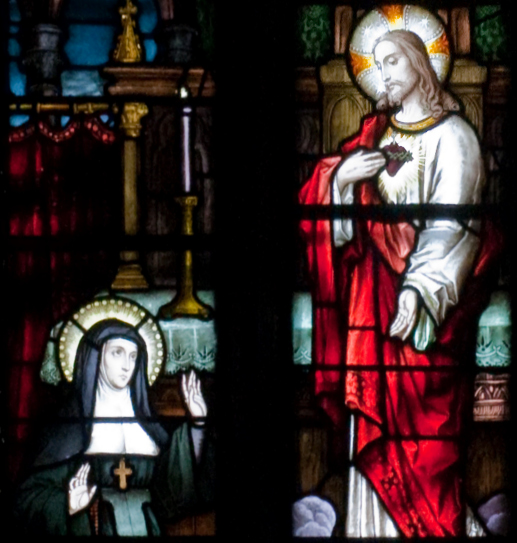Private revelation: Difference between revisions - Wikipedia
 Article Images
Article Images
Line 14:
As the living tradition and the magisterium are a part of divine revelation, they are both believed to have divine authority.<ref>{{Cite CCC|2.1|874}}</ref> Catholicism teaches that because the sacraments are a part of divine revelation, their natures cannot be changed (for example, receiving Holy Communion without mortal sin) but their ways of celebration can be changed (for example, receiving Holy Communion in the hand or on the tongue).<ref name="https://www.vatican.va/roman_curia/congregations/ccdds/documents/rc_con_ccdds_doc_20040423_redemptionis-sacramentum_en.html">''Redemptionis Sacramentum'', 10</ref> Catholic dogma is believed to be a part of divine revelation, and therefore immutable.<ref name="https://www.vatican.va/roman_curia/congregations/cfaith/documents/rc_con_cfaith_doc_20120106_nota-anno-fede_en.html">Note with pastoral recommendations for the Year of Faith: "The Council, according to Pope John XXIII, wanted 'to transmit doctrine, pure and whole, without attenuations or misrepresentations,' in such a way that 'this sure and immutable teaching, which must be respected faithfully, is elaborated and presented in a way which corresponds to the needs of our time.'"</ref><ref name="https://w2.vatican.va/content/john-paul-ii/en/speeches/1984/may/documents/hf_jp-ii_spe_19840503_vescovi-coreani.html">Address of Pope John Paul II to the Bishops of Korea: "In union with Christ you will ponder again what God’s word demands of the Church in Korea. With the courage that comes only with holiness you will accept the full authentic exigencies of the Second Vatican Council for your dioceses. In prayer you will review the perennial teachings of the faith and the ever relevant newness of the Church’s immutable dogmas. In vital communion with Christ, the life-giving vine, and in union with the universal Church, you will continue to preach the word of faith which depends on hearing and which enables the People of God to confess with their lips that Jesus is Lord, to believe in their hearts that God raised him from the dead, and to be saved (Cf. Rom. 10, 9)). This faith - which is nourished in your own hearts and proclaimed with the special episcopal charism that is yours - is the source of all the insights of the faithful, who are called to believe and, in the power of the Holy Spirit, to ponder that belief and live it. "</ref> But what truths are dogmas has needed to be clarified by church councils, and the much more numerous doctrines have yielded to varied and increased understanding based on solid study of the Biblical roots and of the history of the topic. For this the work of theologians is indispensable, since the charism of the bishops is not to receive revelations but to determine what is Catholic teaching, the more so in doctrines that are more central to the faith and dogmatically taught. The Second Vatican Council of Bishops maintained a careful line between the "two source" (Scripture and the living tradition) and "one source" explanation of revelation, careful to acknowledge the ultimate priority of the original deposit of faith: "For Sacred Scripture is the word of God inasmuch as it is consigned to writing under the inspiration of the divine Spirit, while sacred tradition takes the word of God entrusted by Christ the Lord and the Holy Spirit to the Apostles, and hands it on to their successors in its full purity, so that led by the light of the Spirit of truth, they may in proclaiming it preserve this word of God faithfully, explain it, and make it more widely known."<ref>''Dei Verbum'', p. 9</ref><ref>{{Cite book|title=Fundamental Theology|last=O"Collins, SJ|first=Gerald|publisher=Wipf & Stock Pub|year=2001|isbn=1579106765|location=Eugene, Oregon}}, chapter VIII.</ref>
In the doctrine of the ''Catechism'', the revelations in the Word of God{{snd}}such as the apparition of the three [[angels]] to [[Abraham]] and the angel who wrestled [[Jacob]]; the burning bush; the [[theophany]] on Mount Sinai; the pillar of cloud and pillar of fire; the visions and prophecies of the prophets; Elijah's test at the cave, and his [[Entering heaven alive|assumption]]; the revelation to [[Saint Peter|Peter]] ("You are the Christ"); the apparitions of the risen Christ to the [[Apostles in the New Testament|Apostles]], including the exceptional and unique apparition to [[Paul the Apostle|Paul]]; the various miracles recorded in the [[Acts of the Apostles]] and in the [[Epistles]]; and the entire [[Book of Revelation]]{{snd}}are not private revelations but are public revelation, though their original meaning and relevance for modern Catholicism are subject to interpretation.<ref>{{Cite CCC|2.1|66}}</ref><ref>{{Cite CCC|2.1|659}}</ref> The apparition of [[Our Lady of the Pillar]] to [[James, son of Zebedee|James the Greater]] is a private revelation, since it depends on facts not contained in the original deposit of faith. Catholicism teaches that, like the canonization of saints, this revelation will never be dogmatically taught, but is safe for Christian belief.<ref>{{Catholic Encyclopedia|wstitle=Nuestra Señora Del Pilar}}</ref><ref>{{Cite CCC|2.1|83}}</ref><ref name="ccc88" />
The ''Catechism'' maintains that Christ promised that the [[Holy Spirit]] would lead the church into every truth,<ref>{{Cite CCC|2.1|729}}</ref> and that therefore God leads the church into a [[development of doctrine|deeper understanding]] of the original deposit of faith. The magisterium of the Catholic Church, therefore, carefully examines private revelations, to assure that they are in accord with church doctrine.<ref name="va1">{{cite web|url=https://www.vatican.va/roman_curia/congregations/cfaith/documents/rc_con_cfaith_doc_20000626_message-fatima_en.html|title=Message of Fatima|access-date=13 September 2014}}</ref> Catholic sources argue that this is necessary because Christ warned that false prophets would come and that the tree will be known by its fruit.<ref>{{cite web|url=https://www.vatican.va/roman_curia/congregations/cfaith/pcb_documents/rc_con_cfaith_doc_20080511_bibbia-e-morale_en.html|title=The Bible and Morality, 2|access-date=13 September 2014}}</ref><ref>{{cite web|url=https://www.vatican.va/roman_curia/congregations/cfaith/cti_documents/rc_cti_doc_20111129_teologia-oggi_en.html|title=Theology Today, 92|access-date=13 September 2014}}</ref>